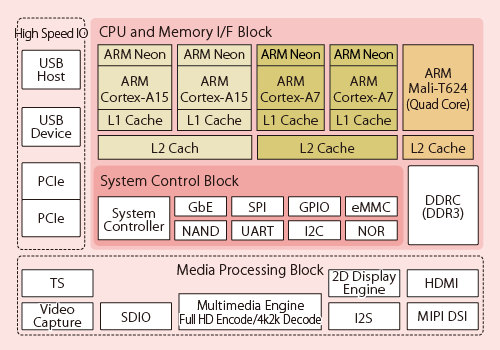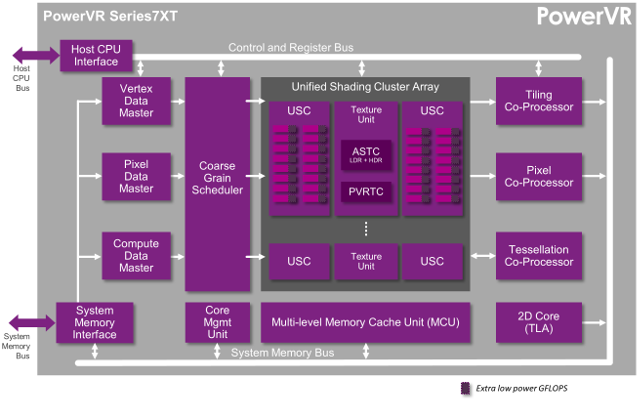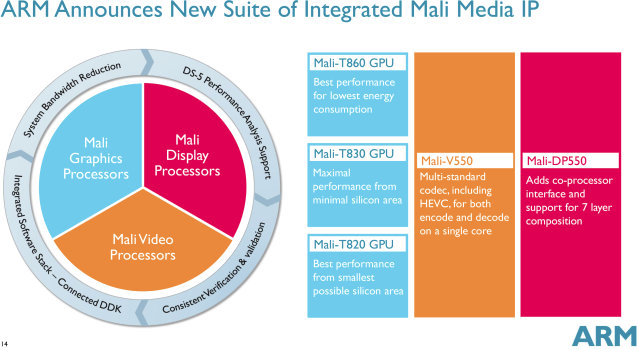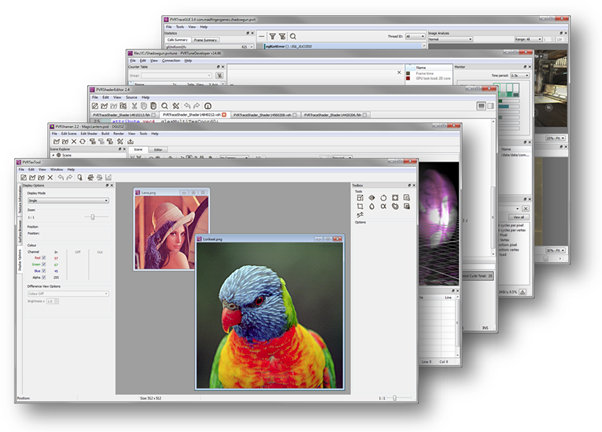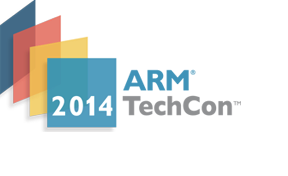I like to check the ARM Linux kernel mailing list from time to time, as you may discover a few upcoming ARM processors. This week I found out Exynos 5433 and Exynos 7 are actually two different processors (thanks David!), and that AMD had submitted code for their 64-bit ARM Opteron A1100 SoC for servers. I also noticed a patchset for Fujitsu MB86S7X SoCs, and since I don’t often mention Japanese silicon vendors, probably because they now mainly deal mostly with the embedded market that gets very little press, and most information is in Japanese, I decide to have a look. There seems to be four SoC parts in MB86S7x family with MB86S70 quad core processor with two ARM Cortex A15 and two ARM Cortex A7 cores in big.LITTLE configuration, and MB86S73 with two ARM Cortex A7 cores only, as well as MB86S71/72 with 2x A15 and 2x A7, with […]
Imagination Technologies Introduces PowerVR Series7 GPUs with Up to 512 Cores, Virtualization Support
Imagination Technologies has announced a new PowerVR Series7 GPU architecture that will be used in their high end PowerVR Series7XT GPUs delivering up to 1.5 TFLOPS for mid range and high-end mobioe devices, set-top boxes, gaming consoles and even servers, as well as their low power lost cost PowerVR Series7XE GPUs for entry-level mobile devices, set-top boxes, and wearables. PowerVR Series7 GPU, both Series7XT and Series7XE GPUs, can achieve up to a 60% performance improvement over PowerVR Series6XT/6XE GPUs for a given configuration. For example a 64-core PowerVR7XT GPU should be up to 60% faster than a 64-core PowerVR Series6XT clocked at the same frequency, with all extra performance due to a different and improved architecture. Some of Series7 architectural enhancements include: Instruction set enhancements including added co-issue capability, resulting in improved application performance and increased GPU efficiency New hierarchical layout structure that enables scalable polygon throughput and pixel fillrate […]
Qualcomm Releases Userspace Adreno 320 GPU Drivers for Ubuntu
Qualcomm Developer Network has just sent the October Newsletter by email, and they had some news specific to Ubuntu / Linux support on IFC6410 development board powered by a Snapdragon 600 processor. Firs they link to a guest blog post on Qualcomm website entitled “Video Conferencing on Linux with the Qualcomm Snapdragon 600 Processor“, where Qualcomm partner eInfochips stated: Qualcomm Technologies, Inc.’s leadership in mobile market with Linux Android support is well established. As the demand for Qualcomm Snapdragon processors, a product of Qualcomm Technologies, Inc., increase in adjacent markets, the need for non-Android Linux support becomes evident. Which is always good to read. The rest of the post blog provides a few more details about their a low-latency (50ms glass-to-glass) video conferencing solution based on OpenEmbedded build with Linaro Linux Kernel, and making use of Qt5, Gstreamer, and Sofia SIP library. Further improvements will be achieved with hardware video […]
ARM Unveils Mali-T800 Series GPUs, Mali-V550 VPU, and Mali-DP550 Display Processor
ARM has just announced several new Mali media IP: three Mali-T800 series GPUs (Mali-T820, Mali-T830, and Mali-T830) based on Midgard architecture, as well as Mali-V500 video accelerator, and the Mali-DP550 display processor. Mali T800 Series GPU The new Mali T-8xx GPUs are based on the same Midgard architecture used in Mali T-6xx and T-7xx GPUs, but deliver better power efficiency thanks to technologies such as ARM Frame Buffer Compression (AFBC), and Adaptive Scalable Texture Compression (ASTC) for imput bandwidth reduction, as well as Transaction Elimination and Smart Composition. ARM provided some performance and energy-comparison between T800 and T600 series (but strangely nothing against T700): The Mali-T820 GPU is optimized for entry-level products, achieving up to 40 percent more performance density compared to the Mali-T622 GPU. The Mali-T830 GPU delivers up to 55 percent more performance than the Mali-T622 GPU. The Mali-T860 GPU provides higher performance and 45 percent more energy-efficiency […]
PowerVR SDK v3.4 Supports WebGL, 64-Bit Android 5.0 Lollipop, and MIPS Linux
Imagination Technolgies has just released PowerVR SDK v3.4 including the latest compilers for PowerVR Series6 and Series6XT GPUs to PVRShaderEditor, several performance optimization, a new WebGL SDK, 64-bit support for Android 5.0 Lollipop, and Linux support for MIPS based processors. The company has revamped the user interfaces of their tools, and made the following key changes: PVRTrace, a tool to capture and analyze OpenGL ES and EGL API calls, now supports OpenGL ES 3.1, compressed trace files, and they’ve reduce the software memory usage PVRTune, a performance analysis tool, now features new counters, and “significant” performance optimizations. PVRShaderEditor, a light-weight shader editing too, adds the latest compilers for PowerVR Series6 (FP32 and FP16) and Series6XT GPUs, as well as GLSL disassembler output. PVRTexTool, a utility for compressing textures, adds plugin support for Autodesk 3DSMax and Maya (2015 versions), and improves ETC decompression by up to 20% faster per surface. Imagination also […]
Linaro 14.09 Release with Kernel 3.17 and Android 4.4.4
Linaro 14.09 has just been released with Linux kernel 3.17-rc4 (baseline), Linux 3.10.54 & 3.14.19 (LSK), and Android 4.4.2 & 4.4.4. Linaro has kept working on their member boards such as IFC6410 (Qualcomm), D01 (Huawei/Hisilicon), Ardnale (Samsung), and Juno (ARM). They’ve also announced they’ll change the tools to build GCC by using cbuild2 instead of cbuild1 for next release, and they’ve enabled a build with gcov (for code coverage analysis) which may mean they’ll work on reducing the kernel size by getting rid off unused code. I’ve also noticed the Arndale and Arndale Octa Ubuntu images are now based on Linux LSK with Mali GPU support since last month. Here are the highlights of this release: Linux Linaro 3.17-rc4-2014.09 GATOR version 5.19 updated topic from Qualcomm LT (ifc6410 board support) and HiSilicon LT updated Versatile Express ARM64 support (FVP Base and Foundation models, Juno) from ARM LT. updated Versatile Express […]
Some Projects on Nvidia Jetson TK1 Development Board: Nintendo Emulator, USB3 Webcam, and Robotics
Nvidia Jetson TK1 is a development board powered by the company’s Tegra K1 quado core Cortex A15 processor, and especially a Kepler GPU that allows for OpenGL 4.4. It has shipped to developers around April/May, and some of them have showcased their projects, or tested some hardware. Dolphin Emulator on Nvidia Jetson TK1 Dolphin is an emulator for Nintendo GameCube and Wii console that supports full HD (1080p) rendering, and run on Android, Linux and Mac OS, and there’s also an Alpha version for Android. Ryan Houdek (Sonicadvance1), one of Dolphin’s developers, has leveraged Kepler’s OpenGL support via Nvidia’s GPU drivers, to port the emulator to the platform running on Ubuntu, but it should work as well on Tegra K1 hardware running Android such as XiaoMi MiiPad tablet. You can watch Mario Kart: Double Dash demo running at full speed on the Nvidia board below. According to the developer, such […]
ARM TechCon 2014 Schedule – 64-Bit, IoT, Optimization & Debugging, Security and More
ARM Technology Conference (TechCon) 2014 will take place on October 1 – 3, 2014, in Santa Clara, and as every year, there will be a conference with various sessions for suitable engineers and managers, as well as an exposition where companies showcase their latest ARM based products and solutions. The detailed schedule for the conference has just been made available. Last year, there were 90 sessions organized into 15 tracks, but this year, despite received 300 applications, the organizers decided to scale it down a bit, and there will be 75 session in the following 11 tracks: Chip Implementation Debugging Graphics Heterogeneous Compute New Frontiers Power Efficiency Safety and Security Software Development and Optimization Software Optimization for Infrastructure and Cloud System Design Verification There are also some paid workshops that take all day with topics such as “Android (NDK) and ARM overview”, “ARM and the Internet of Things”, or “ARM […]


